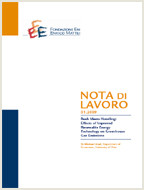Export tariffs combined with public investments as a forest conservation policy instrument

04.04.2017
O24, Q17, Q23, Q24, Q56
Deforestation, REDD+, Export Tariffs, Public Investments, Two Sector Competing Land Use Model
Climate Change: Economic Impacts and Adaptation
Francesco Bosello
The forest conservation policy instrument REDD+ (Reducing Emissions from Deforestation and Forest Degradation) is designed to compensate governments of tropical countries for their efforts to conserve forests. Food insecure countries that are specialized in agriculture and have weak institutions, are likely to face difficulties to enforce forest conservation. This article explores how far export tariffs on agricultural goods combined with public investments, could be used as a forest conservation policy mix in such contexts. We first show empirically that structural constraints to forest conservation policies are particularly pronounced in one third of countries where REDD+ programs are planned to be rolled out. We then develop a two sector competing land use model with a domestic food producing and an exporting agricultural sector. We show that it is possible to combine export tariffs with public investments such that deforestation decreases, while agricultural production levels and food prices remain constant.
***
Suggested citation: Schwerhoff, G., J. Wehkamp, (2017), ‘Export Tariffs Combined with Public Investments as a Forest Conservation Policy Instrument’, Nota di Lavoro 20.2017, Milan, Italy: Fondazione Eni Enrico Mattei
